Sweden in the Eurovision Song Contest
Sweden has participated in the Eurovision Song Contest 59 times since making its debut in 1958, missing only three contests since then (1964, 1970 and 1976). Since 1959, the Swedish entry has been chosen through an annual televised competition, known since 1967 as Melodifestivalen. At the 1997 contest, Sweden was one of the first five countries to adopt televoting. Sweden is the only country to have hosted the event in five different decades, three times in Stockholm (1975, 2000, 2016), twice in Malmö (1992, 2013) and once in Gothenburg (1985).
| Sweden | |
|---|---|

| |
| Member station | Sveriges Television (SVT)
Former members
|
| National selection events | Internal selection
National final
|
| Participation summary | |
| Appearances | 59 (58 finals) |
| First appearance | 1958 |
| Best result | 1st: 1974, 1984, 1991, 1999, 2012, 2015 |
| Nul points | 1963 |
| External links | |
| SVT official homepage | |
| Sweden's page at Eurovision.tv | |
Sweden in the Eurovision Song Contest 2021 | |
Sweden is one of the most successful competing nations at the Eurovision Song Contest, with a total of six victories, second only to Ireland's seven wins, and has the most top five results of the 21st century, with 11. In total, Sweden has achieved 25 top five results in the contest. After finishing second with Lill Lindfors and Svante Thuresson in 1966, Sweden went on to achieve its six victories with ABBA (1974), Herreys (1984), Carola (1991), Charlotte Nilsson (1999), Loreen (2012) and Måns Zelmerlöw (2015).
Contest history
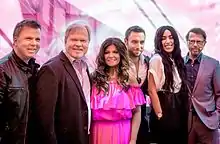
Sweden's first entrant in the contest was Alice Babs in 1958, who was placed fourth. This remained the country's best result until 1966, when Lill Lindfors and Svante Thuresson were second.
Sweden's first Eurovision victory was in 1974 with the song "Waterloo", performed by ABBA. Thanks to their victory in Brighton, ABBA went on to gain worldwide success and become one of the best-selling pop groups of all time. In the 1980s, Sweden achieved three successive top three results. After Carola finished third in 1983, the Herreys gave Sweden its second victory in 1984 with "Diggi-Loo Diggi-Ley". Kikki Danielsson then finished third in 1985. Carola returned to the contest in 1991, to give the Swedes their third win with "Fångad av en stormvind", defeating France in a tie-break. Charlotte Nilsson gave the country a second win of the decade in 1999, with "Take Me to Your Heaven". The 1990s also saw two third-place results, for Jan Johansen in 1995 and One More Time in 1996. In the 2000s, the best Swedish result was fifth place, which they achieved four times, with Friends in 2001, Fame in 2003, Lena Philipsson in 2004 and Carola, who in 2006, became the only Swedish performer to achieve three top five results. Together with Croatia and Malta, Sweden was one of only three countries never to have been relegated under the pre 2004 rules of the contest. Sweden was also the first country to win 3 semifinals.
In 2010, Anna Bergendahl became the first Swedish entrant to fail to make it to the final, finishing 11th in the semifinal, only five points from qualification (in 2008, Charlotte Perrelli finished 12th in the semifinal but qualified through the back-up jury selection). Since then, the country has been very successful, finishing in the top seven in all the editions except one. This includes victories for Loreen, who gave Sweden its fifth victory in 2012 with the song "Euphoria", making Sweden one of only two countries (along with the United Kingdom) to have Eurovision victories in four different decades, and for the sixth time with Måns Zelmerlöw's "Heroes" in 2015. Sweden is one of only two countries - along with Ukraine in 2004 and 2016 with Ruslana and Jamala respectively - to win twice since the introduction of the semi-finals in 2004, performing the feat in both 2012 and 2015 with 372 and 365 points respectively, making Sweden additionally the first country to have scored 300 points or more twice. They also finished third in 2011 with Eric Saade and "Popular", third in 2014 with Sanna Nielsen and "Undo", fifth with Frans and "If I Were Sorry" in 2016, fifth with Robin Bengtsson and "I Can't Go On" in 2017, and fifth with John Lundvik and "Too Late For Love" in 2019.
Melodifestivalen
Melodifestivalen is an annual music competition organised by Swedish public broadcasters Sveriges Television (SVT) and Sveriges Radio (SR). It has chosen the country's representative for the Eurovision Song Contest since 1959. It is Sweden's most popular television shows, and it has been estimated that more than 4 million Swedes watch the show annually.
Almost every Swedish entry for Eurovision has been selected through Melodifestivalen. Only Sweden's first entry in 1958 was not selected through Melodifestivalen, having been selected internally by the Swedish broadcaster at the time, Swedish Radio Service.
Contestants
1 |
Winner |
2 |
Second place |
3 |
Third place |
◁ |
Last place |
X |
Entry selected but did not compete |
Hostings
| Year | Location | Venue | Presenters |
|---|---|---|---|
| 1975 | Stockholm | Stockholm International Fairs | Karin Falck |
| 1985 | Gothenburg | Scandinavium | Lill Lindfors |
| 1992 | Malmö | Malmö Isstadion | Lydia Cappolicchio and Harald Treutiger |
| 2000 | Stockholm | Ericsson Globe | Kattis Ahlström and Anders Lundin |
| 2013 | Malmö | Malmö Arena | Petra Mede |
| 2016 | Stockholm | Ericsson Globe | Petra Mede and Måns Zelmerlöw |
Awards
Marcel Bezençon Awards
| Year | Category | Performer | Song | Composer(s) lyrics (l) / music (m) |
Final result |
Points | Host city | Ref. |
|---|---|---|---|---|---|---|---|---|
| 2002 | Artistic Award[lower-alpha 5] | Afro-dite | "Never Let It Go" | Marcos Ubeda (m & l) | 8 | 72 | ||
| 2006 | Artistic Award[lower-alpha 5] | Carola | "Invincible" | Thomas G:son, Bobby Ljunggren, Henrik Wikström, Carola | 5 | 170 | ||
| 2012 | Artistic Award[lower-alpha 6] | Loreen | "Euphoria" | Thomas G:son (m & l), Peter Boström (m & l) | 1 | 372 | ||
| Composer Award | ||||||||
| 2013 | Composer Award | Robin Stjernberg | "You" | Robin Stjernberg, Linnea Deb, Joy Deb, Joakim Harestad Haukaas | 14 | 62 | ||
| 2015 | Artistic Award[lower-alpha 6] | Måns Zelmerlöw | "Heroes" | Anton Malmberg Hård af Segerstad, Joy Deb, Linnea Deb | 1 | 365 |
Winners by OGAE members
| Year | Song | Performer | Final result |
Points | Host city | Ref. |
|---|---|---|---|---|---|---|
| 2008 | "Hero" | Charlotte Perrelli | 18 | 47 | ||
| 2012 | "Euphoria" | Loreen | 1 | 372 | ||
| 2014 | "Undo" | Sanna Nielsen | 3 | 218 |
Related involvement
Conductors
| Year | Eurovision Conductor[lower-alpha 7] | Melodifestivalen Conductor | Musical Director | Notes | Ref. |
|---|---|---|---|---|---|
| 1958 | No national final held | N/A | Host conductor | [7] | |
| 1959 | Thore Ehrling | Host conductor | |||
| 1960 | Thore Ehrling | ||||
| 1961 | William Lind | ||||
| 1962 | Egon Kjerrman | ||||
| 1963 | William Lind | ||||
| 1965 | |||||
| 1966 | Gert-Ove Andersson | ||||
| 1967 | Mats Olsson | ||||
| 1968 | |||||
| 1969 | Lars Samuelson | ||||
| 1971 | Claes Rosendahl | [8] | |||
| 1972 | Mats Olsson | ||||
| 1973 | Monica Dominique | ||||
| 1974 | Sven-Olof Walldoff | ||||
| 1975 | Lars Samuelson | Mats Olsson | |||
| 1977 | Anders Berglund | N/A | |||
| 1978 | Bengt Palmers | ||||
| 1979 | Lars Samuelson | ||||
| 1980 | Anders Berglund | [9] | |||
| 1981 | |||||
| 1982 | |||||
| 1983 | Anders Ekdahl | ||||
| 1984 | Curt-Eric Holmquist | ||||
| 1985 | Curt-Eric Holmquist | [lower-alpha 8] | |||
| 1986 | Anders Berglund | N/A[lower-alpha 9] | N/A | ||
| 1987 | Curt-Eric Holmquist | ||||
| 1988 | Anders Berglund | ||||
| 1989 | |||||
| 1990 | Curt-Eric Holmquist | ||||
| 1991 | Anders Berglund | ||||
| 1992 | Anders Berglund | [lower-alpha 10] | |||
| 1993 | Curt-Eric Holmquist | N/A | |||
| 1994 | Anders Berglund | ||||
| 1995 | |||||
| 1996 | |||||
| 1997 | Curt-Eric Holmquist | ||||
| 1998 | Anders Berglund | ||||
| 1999 | No orchestra | Anders Berglund | |||
| 2000 | Curt-Eric Holmquist | ||||
Heads of delegation
| Year | Head of delegation | Ref. |
|---|---|---|
| 2013 | Rennie Mirro | |
| 2015 | Christer Björkman | |
| 2016 | Mari Ryberger | |
| 2018 | Christer Björkman |
Commentators and spokespersons
Over the years SVT commentary has been provided by several experienced radio and television presenters, including Jacob Dahlin, Ulf Elfving, Harald Treutiger, Pekka Heino, Kristian Luuk and Fredrik Belfrage. From 2009 to 2018 (except 2013 and 2016), Edward af Sillén provided the SVT commentary alongside various dual commentators.
| Year | Television commentator | Radio commentator | Spokesperson | Ref. |
|---|---|---|---|---|
| 1957 | Nils Linnman | No radio broadcast | Did not participate | |
| 1958 | Jan Gabrielsson | Same as television broadcast | Tage Danielsson | |
| 1959 | Roland Eiworth | |||
| 1960 | Tage Danielsson | |||
| 1961 | Roland Eiworth | |||
| 1962 | Tage Danielsson | |||
| 1963 | Jörgen Cederberg | Edvard Matz | ||
| 1964 | Sven Lindahl | Did not participate | ||
| 1965 | Berndt Friberg | Edvard Matz | ||
| 1966 | Sven Lindahl | |||
| 1967 | Christina Hansegård | |||
| 1968 | ||||
| 1969 | ||||
| 1970 | No television broadcast | No radio broadcast | Did not participate | |
| 1971 | Åke Strömmer | Ursula Richter | No spokesperson | |
| 1972 | Bo Billtén | Björn Bjelfvenstam | ||
| 1973 | Alicia Lundberg | Ursula Richter | ||
| 1974 | Johan Sandström | Sven Lindahl | ||
| 1975 | Åke Strömmer | |||
| 1976 | No television broadcast | Did not participate | ||
| 1977 | Ulf Elfving | Åke Strömmer, Ursula Richter | Sven Lindahl | |
| 1978 | Kent Finell | |||
| 1979 | ||||
| 1980 | Arne Weise | |||
| 1981 | No radio broadcast | Bengteric Nordell | ||
| 1982 | Kent Finell | Arne Weise | ||
| 1983 | Agneta Bolme-Börjefors | |||
| 1984 | Fredrik Belfrage | No radio broadcast | ||
| 1985 | Jan Ellerås, Rune Hallberg | |||
| 1986 | Ulf Elfving | Jacob Dahlin | ||
| 1987 | Fredrik Belfrage | Jan Ellerås | ||
| 1988 | Bengt Grafström | Kalle Oldby | Maud Uppling | |
| 1989 | Jacob Dahlin | Kent Finell, Janeric Sundquist | Agneta Bolme-Börjefors | |
| 1990 | Jan Jingryd | Kersti Adams-Ray | Jan Ellerås | |
| 1991 | Harald Treutiger | Kalle Oldby, Runne Hallberg | Bo Hagström | |
| 1992 | Björn Kjellman, Jesper Aspegren | Kalle Oldby, Lotta Engberg | Jan Jingryd | |
| 1993 | Jan Jingryd, Kåge Gimtell | Susan Seidemar, Claes-Johan Larsson | Gösta Hanson | |
| 1994 | Pekka Heino | Claes-Johan Larsson, Lisa Syrén | Marianne Anderberg | |
| 1995 | Pernilla Månsson, Kåge Gimtell | Björn Hedman | ||
| 1996 | Björn Kjellman | Ulla Rundqvist | ||
| 1997 | Jan Jingryd | Gösta Hanson | ||
| 1998 | Pernilla Månsson, Christer Björkman | Claes-Johan Larsson, Anna Hötzel | Björn Hedman | |
| 1999 | Pekka Heino, Anders Berglund | Carolina Norén | Pontus Gårdinger | |
| 2000 | Pernilla Månsson, Christer Lundh | Carolina Norén, Björn Kjellman | Malin Ekander | |
| 2001 | Henrik Olsson | Josefine Sundström | ||
| 2002 | Claes Åkesson, Christer Björkman | Kristin Kaspersen | ||
| 2003 | Pekka Heino | Kattis Ahlström | ||
| 2004 | Jovan Radomir | |||
| 2005 | Annika Jankell | |||
| 2006 | Jovan Radomir | |||
| 2007 | Kristian Luuk, Josef Sterzenbach | André Pops | ||
| 2008 | Björn Gustafsson | |||
| 2009 | Edward af Sillén, Shirley Clamp | Sarah Dawn Finer | ||
| 2010 | Edward af Sillén, Christine Meltzer | Eric Saade | ||
| 2011 | Edward af Sillén, Hélène Benno | Danny Saucedo | ||
| 2012 | Edward af Sillén, Gina Dirawi | Sarah Dawn Finer (as Lynda Woodruff) | ||
| 2013 | Josefine Sundström | Yohio | ||
| 2014 | Edward af Sillén, Malin Olsson | Carolina Norén, Ronnie Ritterland | Alcazar | |
| 2015 | Edward af Sillén, Sanna Nielsen | Mariette Hansson | ||
| 2016 | Lotta Bromé | Carolina Norén, Björn Kjellman | Gina Dirawi | |
| 2017 | Edward af Sillén, Måns Zelmerlöw | Carolina Norén | Wiktoria | |
| 2018 | Edward af Sillén, Sanna Nielsen | Unknown | Felix Sandman | |
| 2019 | Edward af Sillén, Charlotte Perrelli | Eric Saade |
Costume designers
| Year | Costume designers | Ref. |
|---|---|---|
| 2006 | Lars Wallin | |
| 2009 | Camilla Thulin | |
Photogallery
Songwriting for other countries
No restriction on the nationality of the songwriter(s) and the artist exists in the Eurovision Song Contest rules, which has resulted in countries being represented by songwriters and artist who are not nationals of that country. In recent years Swedish songwriters have been involved in the writing entirely or partly of entries from several countries apart from Sweden.
- In 2010, the songs from Belarus, Denmark, Georgia, Norway, Ireland and Azerbaijan were written entirely or partly by Swedes;
- In 2011, the songs from Russia and Azerbaijan;
- In 2012, the songs from Italy, United Kingdom, Ireland, Malta, Greece, Cyprus, Norway, Azerbaijan and Spain;
- In 2013, the songs from Georgia, Finland, Norway, Russia, Netherlands and Azerbaijan.
- In 2014, the songs from Azerbaijan, Ireland, Denmark, Russia, United Kingdom and Ukraine;
- In 2015, the songs from Azerbaijan, Georgia, Moldova, Macedonia, Netherlands, Spain and Russia.
- In 2016, the songs from Azerbaijan, Bulgaria, Czech Republic, Cyprus, Georgia, Lithuania, Norway, Malta, Moldova and Russia.
- In 2017, the songs from Azerbaijan, Bulgaria, Croatia, Cyprus, Macedonia, Poland, Greece, Ireland, Serbia and Switzerland.
- In 2018, the songs from Austria, Azerbaijan, Bulgaria, Cyprus, Denmark, Finland, Malta, and Poland.
- In 2019, the songs from Azerbaijan, Denmark, Estonia, Malta, Moldova, Cyprus, Switzerland, Norway, the Netherlands, and United Kingdom.
- In 2020, the songs from Denmark, France, Germany and Malta
See also
- Melodifestivalen
- Sweden in the Junior Eurovision Song Contest – Junior version of the Eurovision Song Contest.
- Sweden in the Eurovision Dance Contest – Dance version of the Eurovision Song Contest.
- Sweden in the Eurovision Young Dancers – A competition organised by the EBU for younger dancers aged between 16 and 21.
- Sweden in the Eurovision Young Musicians – A competition organised by the EBU for musicians aged 18 years and younger.
- Sweden in the Turkvision Song Contest – A contest for countries and regions which are of Turkic-speaking or Turkic ethnicity.
- Sweden's voting at the Eurovision Song Contest
Notes
- According to the then-Eurovision rules, the top ten non-Big Four countries from the previous year along with the Big Four automatically qualified for the Grand Final without having to compete in semi-finals. For example, if Germany and France placed inside the top ten, the 11th and 12th spots were advanced to next year's Grand Final along with all countries ranked in the top ten.
- Qualified through the back-up jury selection.
- If a country had won the previous year, they did not have to compete in the semi-finals the following year.
- The 2020 contest was cancelled due to the COVID-19 pandemic.
- Voted by previous winners.
- Voted by commentators.
- All conductors are of Swedish nationality unless otherwise noted.
- Also conducted the Belgian entry
- That year's Swedish national final had the entries presented as music videos, so there was no orchestra present.
- Berglund also conducted and played accordion for the Yugoslav entry, as well as re-arranging the French entry.
References
- "Sweden - Eurovision Song Contest Israel 2019". eurovision.tv.
- "Marcel Bezençon Awards". eurovision.tv. Archived from the original on 16 July 2019. Retrieved 8 December 2019.
- "Winners of the Marcel Bezençon Awards 2012". eurovision.tv. 27 May 2012. Retrieved 8 December 2019.
- "Winners of the Marcel Bezençon Awards 2013". eurovision.tv. 19 May 2013. Retrieved 8 December 2019.
- "Winners of the Marcel Bezençon Awards 2015". eurovision.tv. 25 May 2015. Retrieved 8 December 2019.
- Cobb, Ryan (21 April 2017). "Analysing ten years of OGAE voting: "Underneath the fan favourite bias is a worthwhile indicator"". escxtra.com. Retrieved 8 December 2019.
- Roxburgh, Gordon (2012). Songs for Europe: The United Kingdom at the Eurovision Song Contest. Volume One: The 1950s and 1960s. Prestatyn: Telos Publishing. pp. 93–101. ISBN 978-1-84583-065-6.
- Roxburgh, Gordon (2014). Songs for Europe: The United Kingdom at the Eurovision Song Contest. Volume Two: The 1970s. Prestatyn: Telos Publishing. pp. 142–168. ISBN 978-1-84583-093-9.
- Roxburgh, Gordon (2016). Songs for Europe: The United Kingdom at the Eurovision Song Contest. Volume Three: The 1980s. Prestatyn: Telos Publishing. ISBN 978-1-84583-118-9.
- Granger, Anthony (29 April 2019). "Latvia: Ell & Nikki's Creative Director Brought In For Carousel". eurovoix.com. Retrieved 6 December 2019.
- Knoops, Roy (28 April 2016). "Sweden: Head of Delegation talks about Frans and Eurovision". esctoday.com. Retrieved 7 December 2019.
- "THE VOTING RESULTS OF THE 2ND SEASON OF DEPI EVRATESIL". eurovision.am. 26 February 2018. Retrieved 11 December 2019.
- Ek, Torbjörn (9 April 2019). "Perrelli ny Eurovision-kommentator" [Perrelli new Eurovision commentator]. Aftonbladet (in Swedish). Retrieved 16 January 2020.
- Bokholm, Mirja (28 April 2011). "Eurovision Song Contest 2011: Danny Saucedo delar ut Sveriges poäng i Düsseldorf" [Eurovision Song Contest 2011: Danny Saucedo awards Sweden's points in Düsseldorf]. poplight.zitiz.se (in Swedish). Archived from the original on 30 April 2011. Retrieved 16 January 2020.
- Roxburgh, Gordon (26 May 2012). "Running order for the voting tonight". eurovision.tv. EBU. Archived from the original on 18 June 2012. Retrieved 16 January 2020.
- Bokholm, Mirja (22 April 2013). "YOHIO presenterar de svenska rösterna i Eurovision Song Contest" [YOHIO presents the Swedish votes in the Eurovision Song Contest]. SVT (in Swedish). Archived from the original on 5 May 2016. Retrieved 16 January 2020.
- Albinsson, Mathilde (30 April 2014). "Alcazar presenterar de svenska rösterna i Eurovision Song Contest 2014" [Alcazar present the Swedish votes in the Eurovision Song Contest 2014]. SVT (in Swedish). Archived from the original on 25 April 2016. Retrieved 16 January 2020.
- "Sanna Nielsen och Edward af Sillén kommenterar Eurovision Song Contest". Melodifestivalen. SVT. Archived from the original on 15 April 2015. Retrieved 15 April 2015.
- Dahlander, Gustav (22 April 2015). "Mariette Hansson delar ut Sveriges poäng i Eurovision Song Contest 2015" [Mariette Hansson awards Sweden's points in the Eurovision Song Contest 2015]. SVT (in Swedish). Archived from the original on 5 January 2017. Retrieved 16 January 2020.
- Granger, Anthony (20 April 2016). "Sweden: Gina Dirawi To Announce The Swedish Vote". eurovoix.com. Retrieved 16 January 2020.
- Granger, Anthony (12 April 2017). "Sweden: Wiktoria Announced as Spokesperson For Eurovision 2017". eurovoix.com. Retrieved 16 January 2020.
- "Sanna Nielsen kommenterar Eurovision" [Sanna Nielsen commentates on Eurovision]. Aftonbladet (in Swedish). 9 May 2018. Retrieved 16 January 2020.




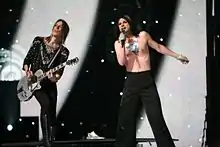
.jpg.webp)
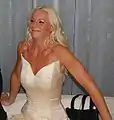
_cropped.jpg.webp)
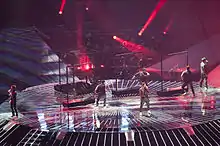

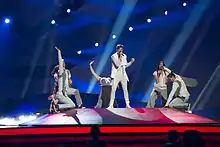


.jpg.webp)
.jpg.webp)

